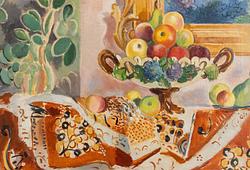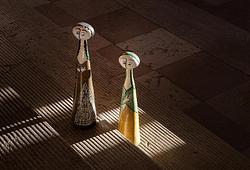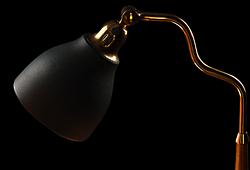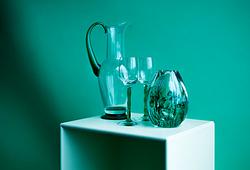Arman (Armand Pierre Fernandez)
"Monochrome Accumulation"
Signerad Arman. Utförd 1986-89. Märkt No. S.001 a tergo. Blandteknik, akryl och färgtuber på duk 77,5 x 50 cm.
Proveniens
Vrej Baghoomian Gallery, New York.
Privat samling, Sverige.
Litteratur
Donald Kuspit, "Arman - Monochrome Accumulations, 1986-89. Catalogue Raisonné", 1990, avbildad helsida sid 121.
Övrig information
”In 1956, I lost a bet with my friend Yves Klein and the penalty was to abandon my own works and do only monochrome paintings. I tried for two weeks with only one color – yellow. Yves understood my distress and decided not to bind me to my promise.
During the following years, I had several encounters with colors. From the way I presented my finished works of accumulations, to broken, sliced, or smashed objects on colored backgrounds using only black, white and red. Or, to the more direct use of colors, by using paint tubes with blobs and ribbons of colors embedded in plastic. And at the same time, I continued to make drawings and gouaches which included silk-screens and lithographs.
About three and a half years ago, I had the urge to renew some of the aspects of tubes and paints embedded in plastic. But, this time directly on canvas and without plastic. Most of the results were interesting but somehow unequal to some of my best works made between 1966 and 1969.
One day my friend Tom Andersson, saw these paintings and was attracted to two of them in particular. One was a white monochromatic accumulation of paint tubes on white canvas and the other was a blue monochromatic accumulation of paint tubes on white canvas. After a talk about the potential of these two works, he then commissioned me to make a body of monochrome paint tubes paintings in New York and became my assistant for the project. We started some months later with a large quantity of acrylic colors in tubes, some paint, some brushes, and different size canvases. Experimenting by myself first before we started, I made three monochrome accumulations on white on white canvas, a green on green canvas and a blue on blue canvas. The difference was that I painted the canvases with the same color as the paint tubes that I was going to use on it.
When I started to use the colored canvases I realized that the first ones were good but not good enough. I decided to cover the tubes themselves with the same color form the tubes. I tried to accomplish this by coloring the tubes after the accumulations were dry and, the tubes affixed to the canvases with small brushes repainting each tube. The result was preferable. I then had a better unity in the painting but the traces of the brush strokes on the paint tubes disturbed me.
The solution came during manipulation of the tubes to create the accumulation. Pressing to get ribbons or blobs of paint, the paint tubes were getting stained by the color after several handlings. The aspect of the tubes smeared with their own color hit me on the spot and, I started to systematically cover the tubes with color by hand before affixing them on the colored canvas. The result was right. The monochrome accumulations were born. The sensuality of the color, the superposition of color on color, until the accumulation of the colored tubes blended the elements together so perfectly that it became clear that I did not have to look for another solution. The variations of the ribbons, the blobs, the crossing of color lead to interesting painting. But, the plain accumulative ones are today my favorites. I am sure now that Yves Klein would have approved it completely because at the end, he really won his bet.”
Arman, New York 1989
Formgivare
Arman (Pierre Fernandez, född i Nice 1928) flyttade efter studenten till Paris för att studera arkeologi och orientalisk konst. Efter att ha återvänt till Nice 1953 ägnade han sig i stället åt abstrakt konst och började samarbeta med Yves Klein, vilket kom att att få stor betydelse för hans konstnärliga utveckling. Efter ett tryckfel i en utställningskatalog på legendariska Galerie Iris Clert i Paris, där bokstaven "d" hade fallet bort från hans namn, beslutade Arman att han hädanefter skulle signera sina verk med endast "Arman".
I slutet av 1950-talet påbörjade han sina skulpturer, först serien Accumulations med vardagliga föremål och därefter Poubelles bestående av skräp.
1960 var Arman med och grundade gruppen Nouveau Réalisme tillsammans med bland andra Jean Tinguely och Daniel Spoerri. Senare anslöt César, Niki de Saint Phalle och Christo. Gruppen opponerade mot den informella konsten och blev den franska motsvarigheten till engelsmännens och amerikanernas popkonst.
Under 1960-talet reste Arman till New York för första gången där han ställde ut på såväl Cordier-Warren Gallery som MoMA. Han fortsatte att utforska skulpturen genom olika serier som Coupes (sågade och skivade objekt), Colères (sönderslagna och trasiga objekt), Combustions (brända objekt) och Inclusioni (assemblage av objekt inneslutna i polyester resin).
De kommande åren visades Armans verk både på Stedelijk Museum, Amsterdam (1964) och på Venedig-biennalen (1968). På 1970-talet skapade han assemblage med cement och bildelar i ett samarbete med Renault. 1973 blev han amerikansk medborgare då han flyttade till New York.
Under de sista tjugo åren av hans liv fortsatte Arman att arbeta med olika material och tekniker. Han har utfört flera monumentala verk som till exempel bronsverket "A la République" (1984) i Palais de l'Élysée, Paris och verket "Espoir de Paix" (1995) i Beirut, ett assemblage med cement och tanks. Det är fortfarande världens största skulptur.
Arman avled 2005 i New York. Under sin levnad deltog han i närmare 500 separatutställningar. Hans verk ingår i dag bland annat i samlingar på MoMA, NY, The National Gallery of Art, Washington, Tate Modern, London och Musée d'Art Moderne et d'Art Contemporain, Nice.
Läs mer



























